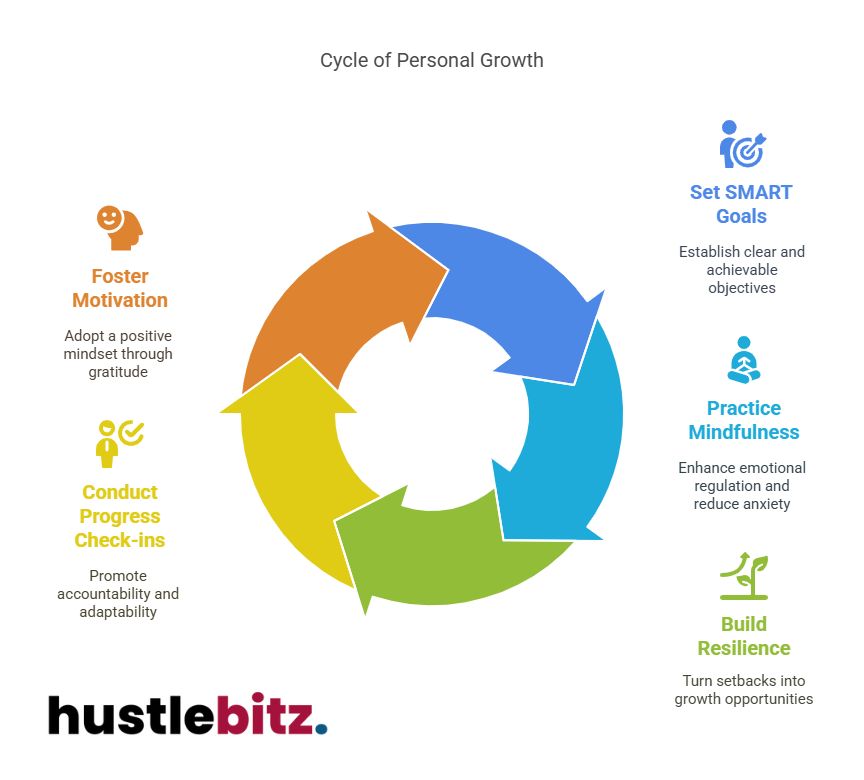Motivation during uncertain times relies heavily on resilience and adaptability. Uncertainty often triggers anxiety and self-doubt, which can erode one’s drive. Key coping strategies include setting SMART goals, creating structured routines, and building a strong support network. Maintaining a positive mindset, bolstered by gratitude and mindfulness practices, equips individuals to face challenges head-on. Viewing change as an opportunity for growth allows setbacks to become valuable learning experiences. Taking proactive steps, such as conducting regular progress assessments, can bring clarity and prevent feelings of aimlessness. These methods improve emotional regulation and decision-making, ultimately boosting motivation. Understanding these key elements is essential for thriving in times of chaos and change. Further exploration of these strategies offers deeper insights.
Key Takeaways
- Set SMART goals to create clear direction and improve focus during unpredictable times.
- Practice mindfulness to enhance emotional regulation and reduce anxiety in chaotic situations.
- Build resilience by turning setbacks into growth opportunities and establishing a supportive network.
- Conduct regular progress check-ins to promote accountability and adaptability.
- Foster motivation by adopting a positive mindset through gratitude, affirmations, and visualization techniques.

Understanding Uncertainty’s Impact

Uncertainty can profoundly affect individuals’ mental well-being, leading to increased anxiety, stress, and a sense of loss of control in their lives. Defined broadly, uncertainty encompasses the lack of definitive knowledge about future outcomes, which can trigger various psychological effects. These effects may manifest as heightened emotional responses, including fear, frustration, or even hopelessness, particularly when faced with situations that are unpredictable or ambiguous.
Individuals often experience decision-making challenges in the face of uncertainty, as the inability to foresee potential consequences can paralyze their ability to act. This indecision can further exacerbate feelings of anxiety and stress, creating a vicious cycle that undermines mental health.
Coping strategies become essential in navigating these turbulent waters. Effective approaches may include establishing routines, setting achievable goals, and seeking social support, which can provide a sense of stability and control amid chaos.
Additionally, cultivating mindfulness and engaging in self-reflection can help individuals better understand their emotional responses to uncertainty. By recognizing and addressing these feelings, individuals can develop healthier coping mechanisms.
Ultimately, an awareness of how uncertainty impacts mental well-being allows individuals to implement strategies that not only mitigate anxiety but also foster resilience. Understanding the interplay between uncertainty and psychological health is crucial for developing robust coping strategies that promote emotional stability during challenging times.
The Importance of Resilience

Resilience is a fundamental trait that enables individuals to effectively navigate and adapt to the challenges posed by change and chaos in their lives. It encompasses a range of resilience strategies that individuals can employ to foster emotional strength and maintain a positive outlook, even in the face of adversity.
Building grit is essential; it involves cultivating perseverance and determination, which are crucial when confronting obstacles. Developing adaptability skills is another vital component of resilience. These skills empower individuals to adjust their approaches and perspectives in response to evolving circumstances.
By remaining flexible, one can better manage unexpected situations and reduce the stress that often accompanies change. Furthermore, resilience is about overcoming setbacks—viewing them as opportunities for growth rather than insurmountable barriers. This mindset shift is pivotal for maintaining motivation during uncertain times.
Individuals can enhance their resilience through various practices, such as mindfulness, self-reflection, and supportive social networks. These practices not only bolster emotional strength but also create a robust framework for coping with life’s unpredictability.
Effects on Motivation

Motivation can be significantly impacted by the chaos and unpredictability of life, often leading individuals to feel overwhelmed or directionless.
The presence of uncertainty can act as a trigger for self-doubt, causing individuals to question their abilities and aspirations. This self-doubt can hinder the motivation required to pursue goals, making goal-setting strategies essential during tumultuous times. Setting clear, achievable goals can provide a sense of direction and purpose, helping to counteract feelings of aimlessness.
To effectively navigate these challenges, developing emotional resilience is crucial. Emotional resilience allows individuals to bounce back from setbacks, reinforcing their motivation to continue striving toward their objectives. Incorporating mindfulness practices can further enhance this resilience, as mindfulness encourages individuals to stay present and reduce anxiety related to future uncertainties. By grounding themselves in the moment, individuals can maintain focus on their goals rather than succumbing to fear of the unknown.
Engaging with accountability partners can also significantly bolster motivation. These partners provide support, encouragement, and constructive feedback, helping individuals remain committed to their goals. The collaborative aspect of having an accountability partner fosters a sense of community and shared purpose, which can be particularly motivating during chaotic times.
Ultimately, understanding the effects of chaos on motivation and implementing these strategies can empower individuals to navigate uncertainty with greater confidence and purpose.
Embracing Change as Opportunity

Recognizing that chaos can disrupt motivation opens the door to viewing change as an opportunity for growth and innovation. Embracing change requires cultivating a growth mindset—an essential perspective that encourages individuals to see challenges as avenues for personal and professional development. By adopting this mindset, one can transform uncertainty into a fertile ground for idea generation and creative problem-solving.
Adaptability skills play a pivotal role in navigating the complexities of change. Individuals who are adept at adjusting their strategies in response to evolving circumstances are better equipped to seize opportunities that arise during tumultuous times. This flexibility not only enhances one’s ability to cope with change but also fosters resilience, enabling a proactive approach to unforeseen challenges.
Opportunity recognition is crucial in this context. It involves identifying potential benefits and advantages that change can bring, rather than merely focusing on the disruptions it causes. By practicing change acceptance, individuals can shift their focus from resistance to exploration, empowering themselves to uncover new possibilities for growth.
Implementing proactive strategies further amplifies the potential for success amidst change. Setting specific, achievable goals allows individuals to channel their energy effectively, maintaining motivation even in the face of uncertainty.
Maintaining a Positive Mindset
Cultivating a positive mindset is essential for navigating the uncertainties and challenges that accompany change, as it empowers individuals to approach obstacles with optimism and determination. A key aspect of maintaining this mindset involves integrating various mental and emotional strategies into daily life.
One effective method is establishing a gratitude practice. By regularly reflecting on what one is thankful for, individuals can shift their focus from what is lacking to the abundance present in their lives, fostering a sense of resilience.
Additionally, visualization techniques can help individuals envision positive outcomes, creating a mental roadmap that guides them through turbulent times. This proactive approach encourages a hopeful perspective, reinforcing the belief that positive change is possible.
Implementing an affirmations strategy further enhances a positive mindset. By repeating constructive and empowering statements, individuals can counteract negative self-talk and reinforce their self-worth.
Mindfulness exercises, such as meditation or deep breathing, promote present-moment awareness, reducing anxiety and enhancing emotional regulation. These practices allow individuals to respond to uncertainty with calmness and clarity.
Taking Action Amidst Chaos

Taking proactive steps amidst chaos is crucial for maintaining a sense of control and direction in uncertain times. A proactive mindset enables individuals to navigate through turbulence by focusing on actionable strategies that foster resilience. One essential element in this process is goal setting, which provides clarity and purpose, allowing individuals to overcome inertia that often accompanies chaotic situations.
To effectively manage chaos, it is vital to implement structured approaches that break down larger objectives into manageable tasks. The following table outlines key strategies for effective chaos management:
| Strategy | Description | Benefits |
| Set SMART Goals | Specific, Measurable, Achievable, Relevant, Time-bound goals help maintain focus. | Increases motivation and clarity. |
| Prioritize Tasks | Identify high-impact tasks to address first, ensuring that energy is directed effectively. | Enhances productivity and reduces overwhelm. |
| Regular Check-ins | Assess progress regularly to adjust plans as necessary, keeping momentum alive. | Promotes accountability and adaptability. |
| Mindfulness Techniques | Incorporate mindfulness to remain centered and reduce stress during chaotic periods. | Improves mental clarity and emotional regulation. |
Motivation in Adversity
Maintaining motivation in the face of adversity requires a deliberate approach that emphasizes resilience and adaptability. The challenges presented by difficult circumstances can often feel insurmountable, but by employing effective strategies, individuals can cultivate a sense of purpose and direction.
One of the most powerful tools for navigating adversity is goal setting. Establishing clear, achievable goals provides a roadmap that helps individuals focus their energy and resources, fostering a sense of accomplishment even amidst chaos.
Personal growth is another critical component of maintaining motivation during tough times. Adversity can serve as a catalyst for self-reflection and development, enabling individuals to discover strengths and capabilities they might not have recognized otherwise. Coupled with this is the importance of emotional intelligence; understanding and managing one’s emotions can enhance resilience and improve decision-making in challenging situations.
In addition, effective coping strategies are essential for sustaining motivation. These strategies can include mindfulness practices, physical activity, and creative expression, all of which contribute to emotional well-being.
Moreover, developing robust support systems is vital. Engaging with friends, family, or professional networks fosters a sense of belonging and provides encouragement, making it easier to navigate through difficult times.
Ultimately, motivation in adversity is not merely about enduring hardships, but about leveraging those experiences for personal growth and resilience. By setting goals, nurturing emotional intelligence, employing coping strategies, and utilizing support systems, individuals can emerge from adversity stronger and more motivated than before.
Final Thoughts
Navigating uncertainty and chaos requires resilience, adaptability, and a proactive mindset. By setting clear goals, building supportive networks, and embracing change as an opportunity for growth, individuals can maintain motivation even in challenging times. The key lies in cultivating a positive mindset, using mindfulness to regulate emotions, and taking small, decisive actions to create a sense of control. These strategies foster emotional strength, improve decision-making, and allow individuals to thrive amidst chaos, turning adversity into a platform for personal and professional growth.




